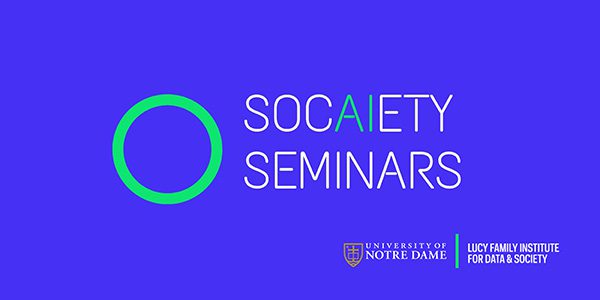TEC Talks: Identity and Power
Subscribe to the ThinkND podcast on Apple, Spotify, or Google.
Featured Speakers:
- Yussuf Bashir, Executive Director, Haki na Sheria
- Nanjala Nyabola, Independent Writer and Researcher, Nairobi, Kenya
On September 27, 2021, the Notre Dame-IBM Technology Ethics Lab and Notre Dame Technology Ethics Center (ND-TEC) hosted the second session of the fall TEC Talks series. This semester, the series focuses on the intersection of technology and power. The guests for the second session were Yussuf Bashir, Executive Director of Haki Na Sheria, and Nanjala Nyabola, a Nairobi-based independent writer, researcher, and political analyst. The discussion focused on the topics of digital identity systems and their relationship to efficiency, human rights, and international perceptions.
An example of such digital identity systems is the National Integrated Identity Management System (NIMS) in Kenya. According to Bashir, this system created a separate digital citizen distinct from the living person. This system was introduced to modernize and standardize the country’s manual identification system, which had been in existence since the colonial era and had been deemed error prone. NIMS was developed to solve all identity-based issues that arose in Kenya. Nyabola noted that NIMS was received with mixed support due to a lack of transparency about the wide array of data collected, a patrilineal system that makes it more difficult for women and orphans to prove their identity, and threats of the denial of government services to those who did not register in the new system. Further, Bashir and Nyabola noted that the NIMS system did not go far enough to address the causes of inequality, specifically as it relates to the concept of vetting. Historically, vetting citizens based on ethnicity created higher standards for proof of identity for specific ethnic groups, such as the Nubians, and in turn reduced their access to government and technological services.
To further compound issues related to the rollout of this system, there were challenges to communicate the purpose and functions of the system to citizens due to a language barrier: Nyabola noted that the second national language of Kenya, Kiswahili, does not have words for many of the technology- or privacy-related concepts which were fundamental to the NIMS system, which was written in English. This language barrier presented issues for the many Kenyan citizens who do not speak English, as well as groups advocating to inform citizens. This led to a sense of fear that the government could coerce its citizens into giving up personal information and then, as a part of a larger multinational effort, monetize their citizens’ data.
Nyabola noted that another application of these digital identification systems is their use in keeping vaccination records: not only for COVID-19, but for measles, yellow fever, and polio. In developing nations, these digital systems are often developed by foreign firms due to a lack of trust between nations about the integrity of record keeping. These systems can create a distrust of the government and normalize a level of exclusion of citizens from developing nations.
Bashir noted that a related issue is the biometric registration system set up by the UNHCR as a way to verify the identity of refugees in northern Kenya. This database was then turned over to the Kenyan government without the consent of the refugees, leading to the loss of their status as Kenyan nationals, rendering them “double-registered” and effectively stateless.
Nyabola highlighted that these systems are heavily rooted in the history of oppression and exclusion of specific ethic groups dating back to Kenya’s colonial period and noted that the government of Kenya has struggled to move away from ethnicity-influenced policymaking compared to many other postcolonial states.
- The National Integrated Identity Management System (NIMS) was introduced in Kenya intended to replace the manual ID system, a legacy of Kenya’s colonial occupation by the British.
- The rollout of NIMS was met with resistance due to the wide array of personal information collected, short period for registration, systematic exclusion of certain ethnic groups, and a lack of public consultation about how the system should work.
- The NIMS system was in English only, systematically excluding those who primarily speak Kiswahili, Kenya’s second national language. Furthermore, Kiswahili lacks words for some privacy- and security-related concepts key to NIMS, and little effort was made to educate or inform Kiswahili-speaking citizens.
- The lessons learned from the rollout of NIMS will have bearing on future digital identity schemes in Kenya, such as those tracking vaccination records for COVID-19, polio, and yellow fever.
- “Just to give context in terms of the threats that were used at a time of registration, there was a statement by the Minister of the Interior who said that ‘We will not force you to register, but you will have no option but to register.’ … I mean, everyone was getting phone calls from their relatives, I mean, the older generation was always used to a very fearful and oppressive government. I was the lead counsel on the case opposing the rollout of the Huduma Namba and my parents kept calling me every day to go and register, and that shows you the level of pressure that was being exerted on the ordinary Kenyan.” (Yussuf Bashir, 9:34)
- “Essentially, this was the creation of a new digital citizen in Kenya that was separate from the the living, corporate citizen and this digital system being created was not in any way connected to an individual that currently existed, save for the fact that you needed an ID number, if you are an adult, or a birth certificate, if you are a minor. The amount of information that was being sought was also quite far reaching. I mean, before we filed the case, the government even wanted had provision for collection of nearly any GPS data, and that was quite interesting and scary if that kind of data is available to our government, so the level of consultation was was obviously not commensurate to the effect that it would have on the lives of Kenyans.” (Yussuf Bashir, 11:10)
- “Ultimately, the Kenyan government system did not break away completely from the colonial logic of oppression and exclusion … The political construction of ethnicity in Kenya does not reflect the lived reality of most Kenyans. On a day-to-day basis most Kenyans will move fluidly between different aspects of identity, but here comes the ID system telling us that you can only be one thing, and that thing is something that is determined by your father. And, not even by your mother, and not even by any other ways of thinking about religion, all of these ideas again are about a certain vision of what government is for.” (Nanjala Nyabola, 37:03)
- “Ultimately, governance is about a balance of power between citizens, and using citizens in the broader sense of the word, not necessarily constraining to people who belong to a specific political entity, but it’s about individuals who have civic and political rights and it’s about balancing those civic political rights obligations with the power that the government has over those people.” (Nanjala Nyabola, 52:57)
Related Content
Climate Change and The Limits of Narrative
Join the Kellogg Institute for the introductory session of a workshop refining Kellogg Faculty Fellow Roy Scranton’s draft book project “Ethical Pessimism: Climate Change and...
View EventA Brave New World of AI Governance
Explore the connection between data, geopolitics and governance, regulation, self-regulation while discovering examples of good and bad practices in various sectors, such as...
View EventAlgorethics: potentiality and challenges in the age of AI
Explore the possibilities and challenges in ethical governance of AI through algorethics. Algorethics is a term that has been developed since 2018 to denote the need for a study...
View Event

